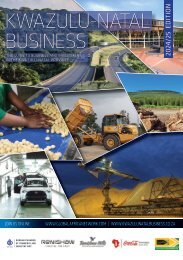Gauteng Business 2016 edition
The 2016 edition of the Gauteng Business and Investment Guide is the premier business and investment guide for the Gauteng province and the Gauteng Growth and Development Agency (GGDA). In addition to detailed profiles of key provincial organisations, including the GGDA, the Automotive Industry Development Corporation Centre (AIDC), the Gauteng Investment Centre, the Gauteng IDZ, the Gauteng ICT Park SEZ and Constitution Hill, this edition includes well-researched economic and demographic data on the province, as well as insights into the province’s five development corridors and the new industries and development nodes in these corridors; a focus on Gauteng as a global city region; and key growth sectors for the province.
The 2016 edition of the Gauteng Business and Investment Guide is the premier business and investment guide for the Gauteng province and the Gauteng Growth and Development Agency (GGDA). In addition to detailed profiles of key provincial organisations, including the GGDA, the Automotive Industry Development Corporation Centre (AIDC), the Gauteng Investment Centre, the Gauteng IDZ, the Gauteng ICT Park SEZ and Constitution Hill, this edition includes well-researched economic and demographic data on the province, as well as insights into the province’s five development corridors and the new industries and development nodes in these corridors; a focus on Gauteng as a global city region; and key growth sectors for the province.
You also want an ePaper? Increase the reach of your titles
YUMPU automatically turns print PDFs into web optimized ePapers that Google loves.
Transport options<br />
Motor vehicle: As much as<br />
R23-billion has been spent on<br />
upgrading the road network<br />
across <strong>Gauteng</strong>. South African<br />
National Roads Agency Limited’s<br />
(SANRAL) <strong>Gauteng</strong> Freeway<br />
Improvement Project (GFIP) represents<br />
a key element of this programme<br />
of upgrades, and is set<br />
to drastically reduce travel times<br />
and traffic congestion along key<br />
routes within the province’s urban<br />
centres. It will also improve<br />
accessibility into <strong>Gauteng</strong> and<br />
inject approximately R29-billion<br />
into the economy.<br />
Rail and bus<br />
In recent years, a great deal of<br />
attention has been placed on<br />
upgrading the capacity of South<br />
Africa’s rail network and infrastructure.<br />
The Passenger Rail Agency<br />
of South Africa (PRASA) is set to<br />
spend R123-billion in the acquisition<br />
of 7 224 new trains, which will<br />
be added to its fleet at a proportional<br />
rate every year over the next<br />
two decades. General Electric is<br />
also partnering with Transnet to<br />
produce new locomotives for use<br />
within South Africa.<br />
A variety of public transport<br />
bus services are available in major<br />
urban centres within <strong>Gauteng</strong>.<br />
These include the Rea Vaya BRT<br />
System, Metrobus and Gautrain<br />
bus services. In Johannesburg,<br />
the one-way cost of a Rea Vaya<br />
bus ticket ranges from R5.50 on<br />
inner city circular routes and R8.50<br />
on trunk routes (the main routes<br />
from one destination to another),<br />
to R12.00 for the full trip from the feeder routes to the Central <strong>Business</strong><br />
District (CBD).<br />
Taxi<br />
Metered taxi cabs in <strong>Gauteng</strong> typically charge R10 per kilometre<br />
with a flag rate of up to R50, although this can vary significantly<br />
depending on the company. This is relatively expensive when<br />
compared with equivalent fares charged by taxi cabs in other large<br />
cities internationally. For instance, the standard taxi fare in New York<br />
City is around US$2.50 upon entry and an additional US$0.5 for each<br />
one-fifth of a mile, which equates to a flag rate of approximately<br />
R23 and an additional charge of R5 for every 1.6 kilometres.<br />
Office rentals<br />
Rental rates for commercial property in South Africa are relatively<br />
affordable by most international comparisons. In 2010, the cost of<br />
rent for the average store owner in Johannesburg amounted to<br />
just 4 percent of that paid by his or her counterpart in London’s<br />
West End. In that same year, Johannesburg, together with Durban<br />
and Cape Town, were ranked as the most affordable destinations<br />
in terms of the cost of office rentals out of 55 cities worldwide,<br />
with rental rates varying between R110 per square metre and R140<br />
per square metre.<br />
Starting a business in <strong>Gauteng</strong><br />
SPECIAL FEATURE<br />
There are various types of business structures available in South<br />
Africa, namely sole proprietor, private company, public company,<br />
partnership, business trust, non-profit organisations, joint ventures<br />
and an external company (which is a branch of a foreign company).<br />
Ease of doing business comparisons with other countries<br />
At the global level, South Africa performs relatively well along a<br />
number of cross-country measures of competitiveness and the ease<br />
of doing business. In 2010/11, the World Economic Forum’s Global<br />
Competitiveness Report ranked South Africa in 54th position out of<br />
139 countries. In the latest Doing <strong>Business</strong> report produced by the<br />
World Bank, South Africa was ranked first out of 185 countries for the<br />
ease of acquiring credit; and also ranked relatively highly in terms of<br />
investor protection (10th).<br />
41 GAUTENG BUSINESS <strong>2016</strong>


















